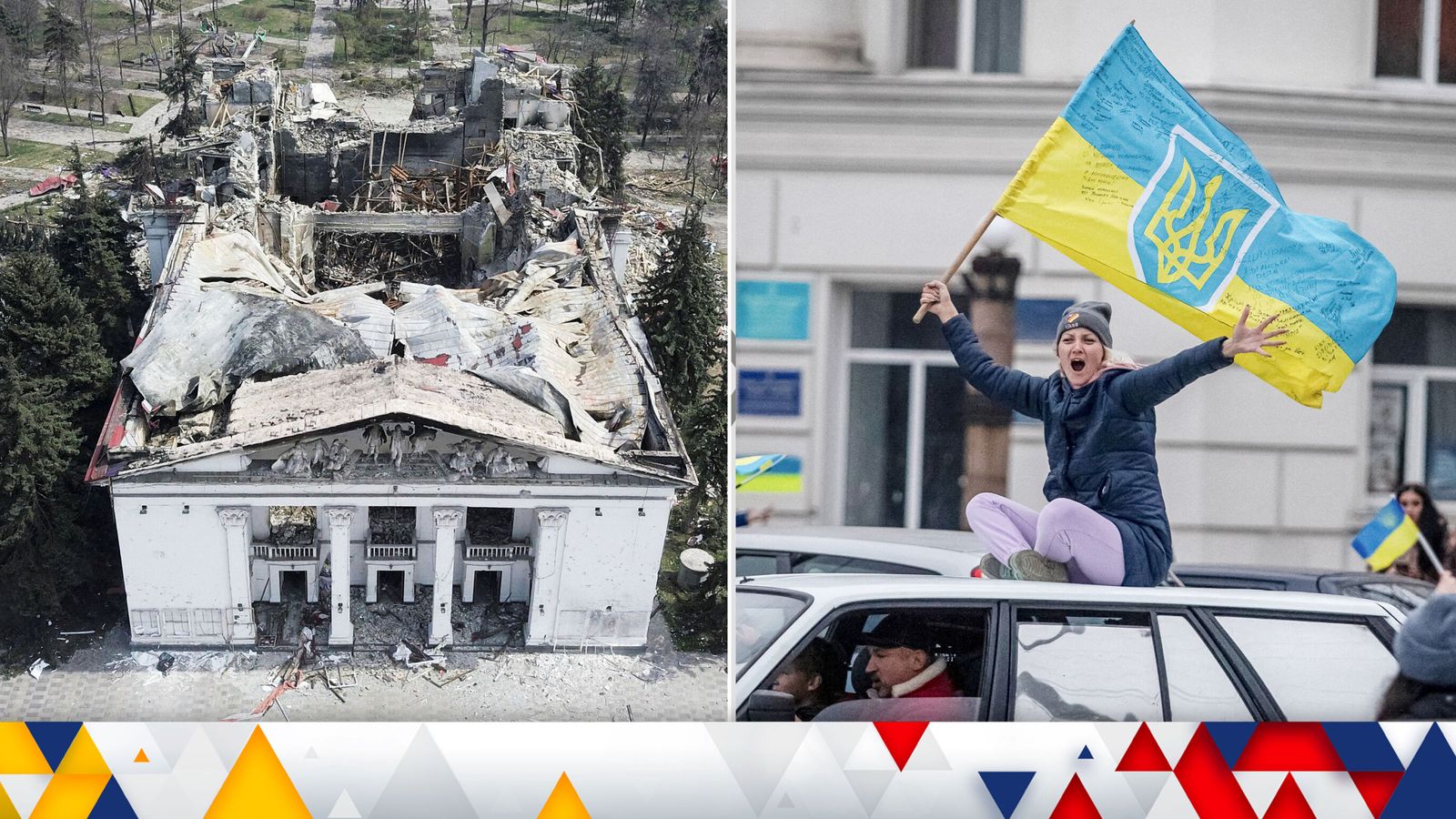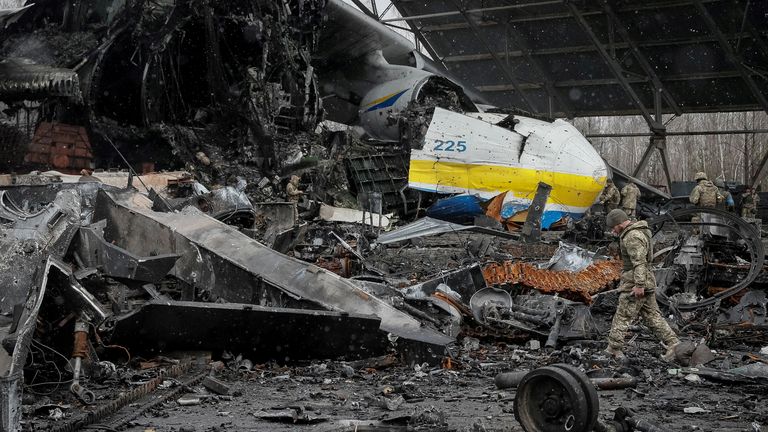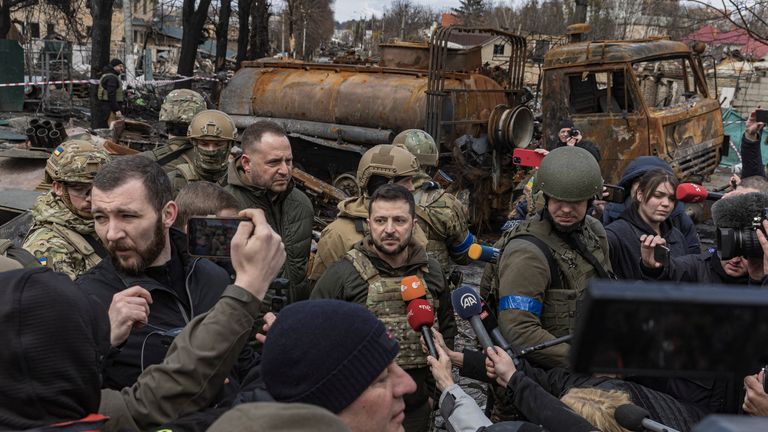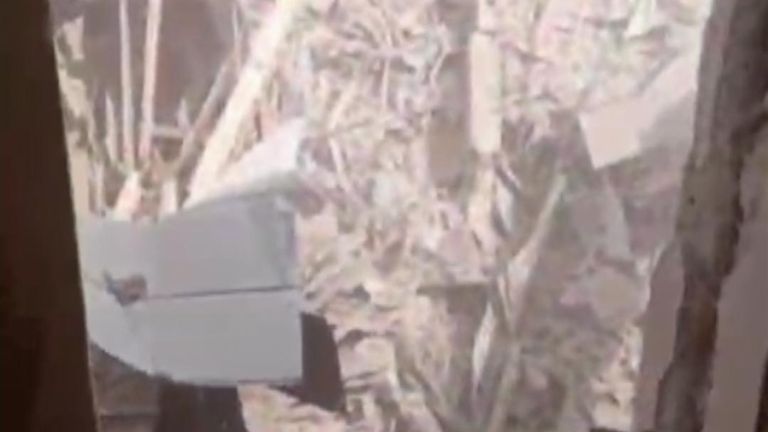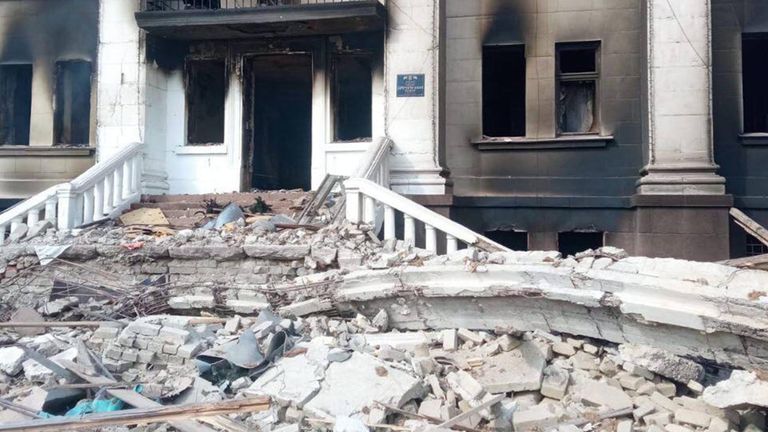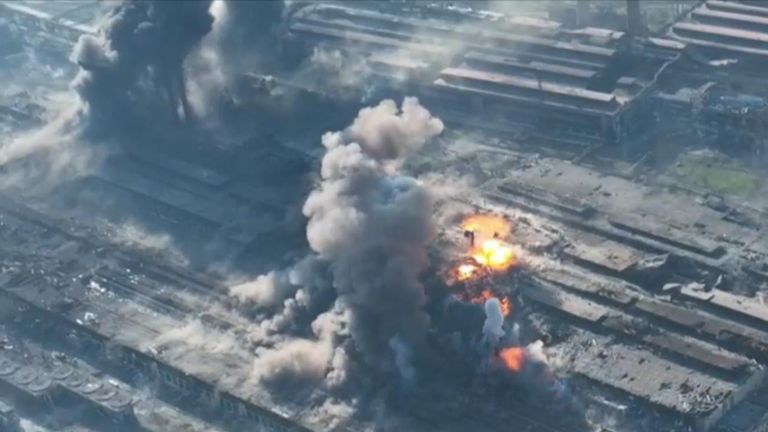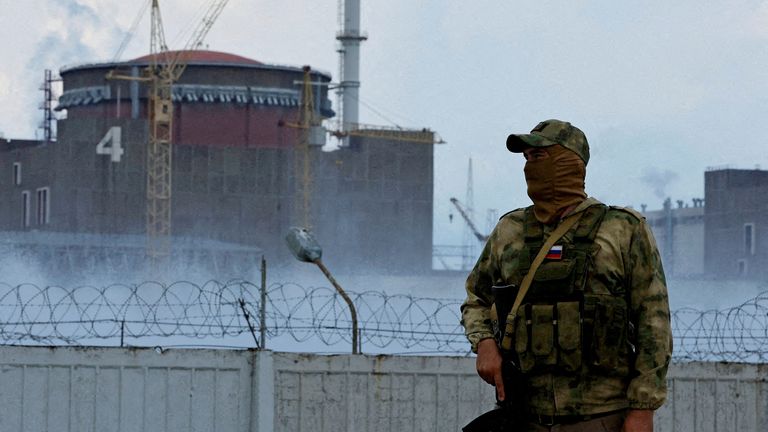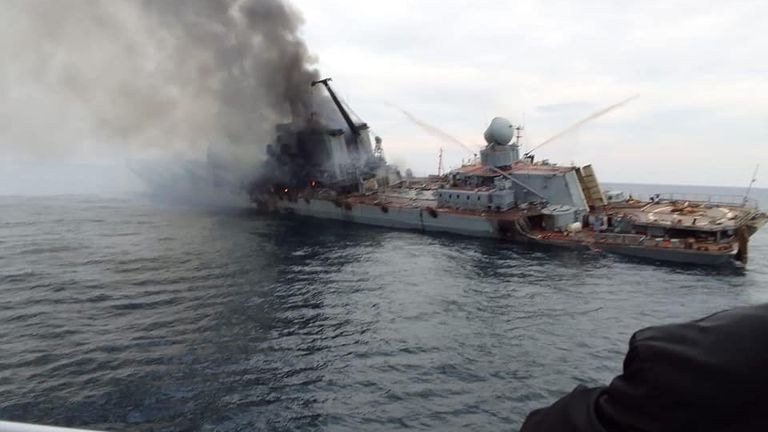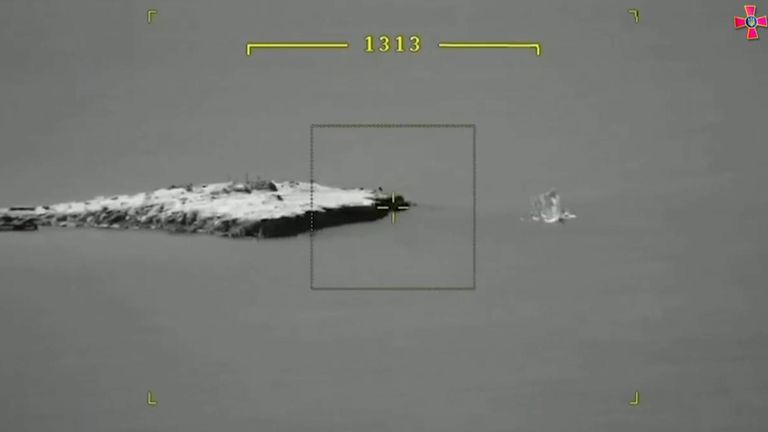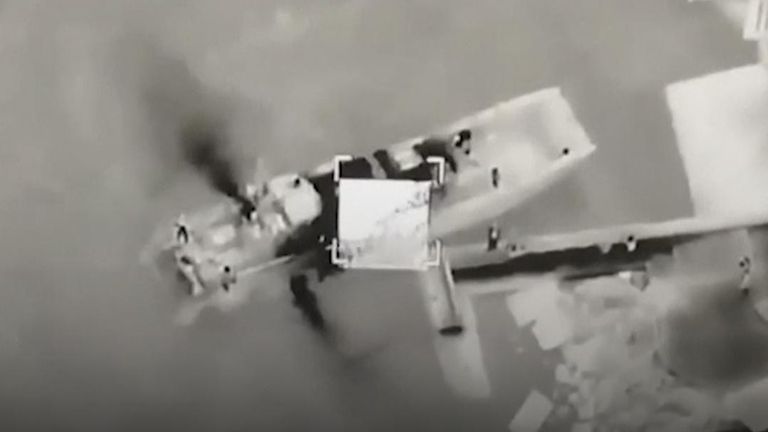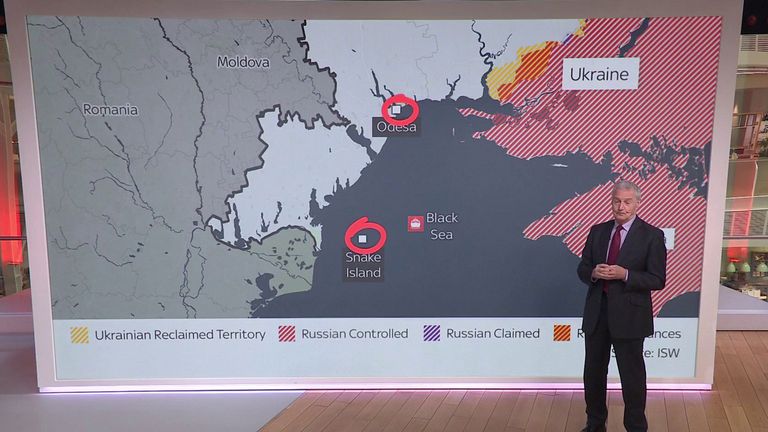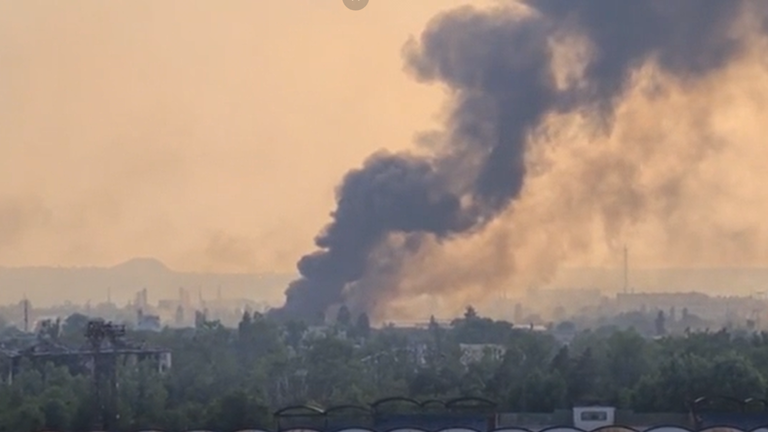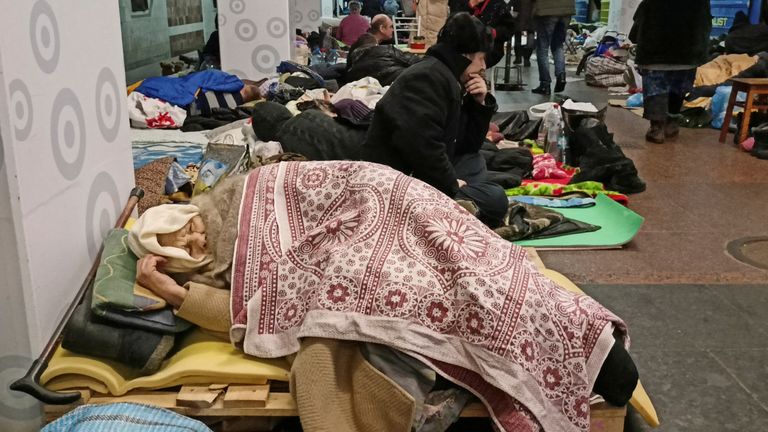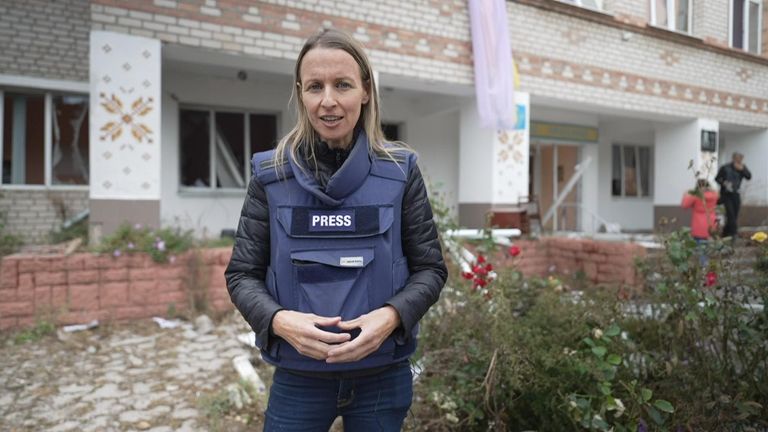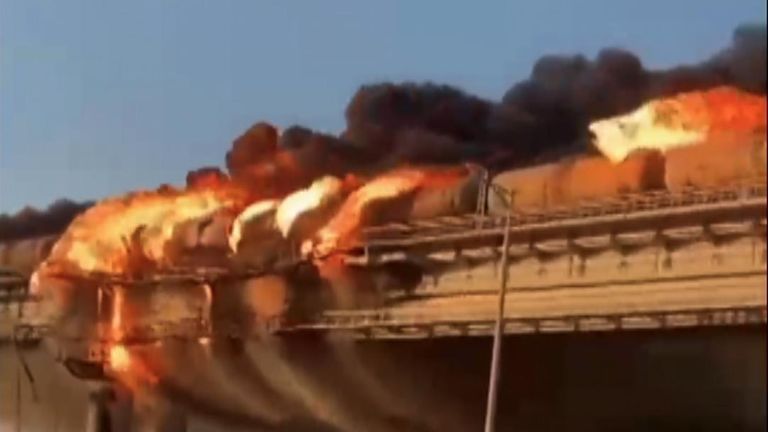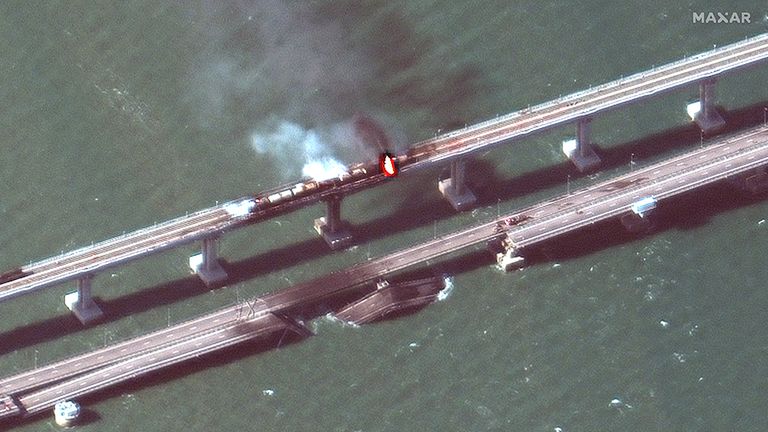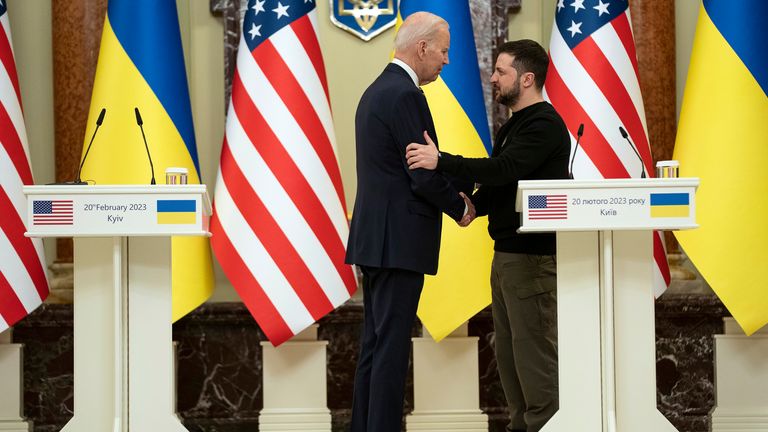Russia’s tanks were rolling towards Kyiv, their fighter jets screaming overhead. Vladimir Putin was hoping for a blitzkrieg strike that would see the Ukrainian president dead and the nation subjugated.
But his plan failed, and a year later Ukraine’s armed forces have thrown back the “second army in the world” and are preparing to launch another offensive.
The past 12 months are a story of Ukrainian defiance against the odds, and the awakening of NATO into sending more and heavier weapons to help repel Kremlin forces.
From the recapture of Snake Island (and certain choice words for a Russian warship) to the liberation of Kherson, there are a number of moments in the conflict that stand out.
Sky News spoke to two military analysts about the key points in the war so far.
Russian forces pushed back from outside Kyiv – February 2022
At the start of the full-scale invasion, Russian forces planned to sweep down from Belarus to the Ukrainian capital, the idea being that taking Kyiv quickly would paralyse any resistance.
As part of the plan, they targeted a small airport at Hostomel less than 20 miles from the city centre.
“That was really critical,” Professor Michael Clarke tells Sky News.
“Their failure to take Hostomel or to hold it – they took it and then the Ukrainians got it back within hours – cost them the rapid strategy that might otherwise have worked.”
As it turned out, Kyiv did not fall and its successful defence fuelled the country’s resistance while images even showed a miles-long column of Russian tanks and vehicles stuck in the mud for weeks and subsequently abandoned.
Towns retaken, but Russian atrocities revealed – March 2022
The city had been saved, but the harrowing consequences of Russia’s invasion were quickly laid bare.
As Kremlin troops withdrew from around Kyiv, Ukrainian soldiers moving into recently liberated towns found horrific evidence of human rights abuses.
Images from the commuter town of Bucha, just outside Kyiv, showed dead bodies with their hands tied behind their backs – seemingly shot at close range.
The scenes provoked international outcry and were described by President Zelenskyy as “genocide”.
‘The heroes of Mariupol’ stand as their city burns – February to May 2022
As Russian forces pushed up from Crimea in the south, they faced resistance in the port city of Mariupol.
Vast amounts of the city were razed to the ground by Russian troops, buildings reduced to rubble and homes torn down.
The death toll could be in the tens of thousands.
In one harrowing incident, hundreds of people took shelter in a theatre building and marked the word “children” in large letters in front of the building to dissuade attacks.
On the 21st day of the war the theatre was destroyed by a missile strike, killing an estimated 600 people.
Maria Radionova, 27, who was among those who made it out of the theatre alive, said she believes the panic of the crowd rushing to escape killed more people than the strike itself.
With Russian forces closing in, the city’s defenders were forced to withdraw into the Azovstal steelworks. Described as a “fortress within a city”, the huge factory sat atop a network of underground tunnels.
Despite appalling odds and shortages of supplies, Ukrainian forces in the factory held out for more than 80 days.
They were finally ordered to surrender in May.
The image below shows how mills and warehouses situated towards the centre of the plant were damaged in the Russian bombardment.
“There’ll be films made” about the defence of Mariupol in future, says military analyst Sean Bell.
“The heroes of Mariupol have set an outstanding example for the rest of Ukraine, to show that the Russians may have greater size and greater scale but David can prevail against Goliath. Mariupol became symbolic of that.”
The defenders of Mariupol were also hailed for keeping large numbers of Russian forces busy in the south, allowing Ukrainians time to regroup and obtain Western weapons.
Read more:
Satellite imagery shows damage to Azovstal steelworks
The pounding of Azovstal – pictures that tell a thousand words
An eyewitness account from Kyiv’s ‘highway of death’ in June 2022
Fears of disaster as Russian forces capture Europe’s biggest nuclear power plant – March 2022
Ukraine is a country that already knows the danger, and terror, of a nuclear accident.
The 1986 disaster at Chernobyl is still in living memory. The once-busy city of Pripyat lies empty, its buildings rusting away in the wasteland.
So when Russian troops moved towards the Zaporizhzhia Nuclear Power Plant in the second month of the 2022 invasion, alarm bells went off in Ukraine and across Europe.
There was heavy fighting for control of the area around the facility.
A large bullet pierced an outer wall of one of the reactors. An artillery shell hit an electrical transformer at another reactor, which was filled with flammable cooling oil.
We may never know how close Europe came to another nuclear catastrophe.
The power plant has now been under Russian control for months, with both sides accusing each other of shelling the facility.
When international experts were finally allowed in to inspect the damage, they reported that its “physical integrity” had been “violated”.
Pride of the Russia’s Black Sea Fleet is sunk – March 2022
The Moskva was a flagship of the Russian Navy that served as a guided missile cruiser.
Perhaps thought to be untouchable way off the coast, it now lies at the bottom of the sea after being hit with Neptune missiles.
The image below shows how infrastructure on the deck appeared flattened and warped in places before the vessel sank.
“It should have been safe as houses because the Ukrainians didn’t have a credible air power or control of the seas,” Bell says.
“Russian incompetence led to the Moskva being lost. That’s another example of how that will have lifted the morale of the Ukrainians.”
The sinking of the Moskva was met with retaliation by Russia, which launched a wave of missile strikes on Ukraine.
“Russian warship, go f*** yourself.” Snake Island is recaptured – June 2022
“Russian warship, go f*** yourself.”
The last communication by border guard Roman Hrybov to the Russian Moskva cruiser on the first day of the invasion echoed around the world.
The remark came as the warship attacked Snake Island, a small isle in the Black Sea which was subsequently captured.
Initially thought to be dead, Hrybov and some of his comrades were later freed in a prisoner exchange.
A painting reimagining the defiant exchange featured on stamps in Ukraine – some of which have sold for thousands of pounds on eBay.
Ukraine eventually forced the withdrawal of Russian troops on the island on 30 June.
Bell said that Snake Island had symbolic value to Ukraine and its morale, but questioned its strategic importance.
He said: “It became a bit of a fight over some arbitrary bit of rock in the Black Sea because neither side were able to capitalise and actually get all the hardened emplacements there and then put the right equipment on.
“So again, it became a bit of a symbol of Ukrainian resistance.”
Read more:
Snake Island soldier gets bravery award
Severodonetsk and Lysychansk – two cities fall to Russia – June 2022
The battle for the Donbas region in eastern Ukraine has been fierce, with huge numbers of casualties on both sides.
Much of the fighting centred around the cities of Severodonetsk and Lysychansk. The pair fell within days of each other around the end of June.
“This was the only good bit of manoeuvre warfare (The Russians) conducted,” says professor Clarke. “They got behind Ukrainian defenders… (who) had to give it up or they were going to get surrounded.”
Fears that the captures could turn into a deeper Russian advance did not come to pass, however.
Ukraine gains chunks of territory in Kharkiv offensive – September to October 2022
The airwaves were full of Ukrainian claims that it would push to retake the southern city of Kherson.
So when its forces launched a counteroffensive around the city of Kharkiv it came as a surprise, punching through Russian lines in a stunning advance.
Ukrainian troops liberated Balakliya and Kupyansk south east of the city of Kharkiv, as well as the key logistical town of Izyum which serves as an important transportation hub.
President Zelenskyy said the offensive had liberated thousands of square miles of territory.
Hailing the work of his armed forces, he said: “These days, the Russian army is showing its best – showing its back. And, in the end, it is a good choice for them to run away.
“There is and will be no place for the occupiers in Ukraine.”
Attack on the Kerch Bridge – October 2022
The Kerch Bridge connecting Russia with occupied Crimea is the longest in Europe. It’s also seen by some as a symbol of Russia’s illegal annexation of the peninsula.
Construction began in 2016 and the bridge was officially opened by Vladimir Putin in May 2018.
Unsurprisingly, Ukrainian calls for the bridge’s destruction ramped up after the February 2022 invasion.
On 8 October part of the bridge exploded, sending a plume of smoke and flame into the air and hampering the flow of traffic.
Bell said that while “tactically insignificant”, the attack on the Kerch Bridge and similar events “demonstrate that Russia isn’t safe behind its own front line”.
Cheers as Kherson is finally liberated – October 2022
Jubilation, tears and blue and yellow flags waved in the air.
After eight long months, the city of Kherson, the only major city captured by Russia, was liberated after Russian forces withdrew.
It was a huge win for Ukraine and a “tremendous defeat” for Russia, according to professor Clarke.
But the significance of Kherson depends on how you look at Mr Putin’s war aims, says Bell.
He argues that if the Russian president decides to focus on the Donbas before declaring “success” and calling for a ceasefire, then the loss of the city is less relevant.
Europe and US announce tanks for Ukraine – January 2023
From the beginning of the full-scale invasion voices in Ukraine had been calling for the West to send tanks to help their defenders repel Russian attacks – but to no avail.
There was a perception in some quarters that doing so would be seen as an escalation in the Kremlin, with unpredictable consequences.
However, following the success of the Kharkiv offensive and the liberation of Kherson, Ukraine’s allies agreed to send heavier weapons to the battlefield.
The UK, which arguably led the way in arming Ukraine as the invasion loomed all those months before, announced it would send 14 Challenger 2 main battle tanks to Kyiv.
While only a small amount of the tanks Ukraine had asked for, it has been suggested by commentators that this was Britain trying to spur its NATO allies into action and giving them some amount of cover.
And it appears to have worked, with a host of European countries pledging Leopard 2 tanks and the US promising to send some of its own Abrams tanks.
President Joe Biden’s visit the following month has only served to underscore the continued Western resolve.
As Ukraine prepares for its much-anticipated spring offensive from Russia, it is thought that these tanks could have a real difference on the battlefield – if they can get there in time.
